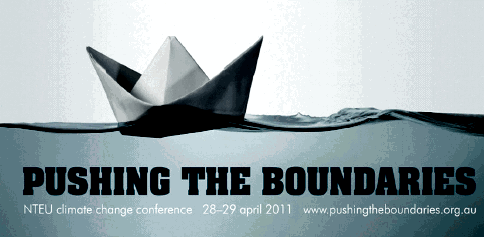
|
|
|
|
|
|
|
News & Views item - April 2011 |
![]() NTEU President Opens National Climate Change Conference. (April 28, 2011)
NTEU President Opens National Climate Change Conference. (April 28, 2011)
Over the next two days the National Tertiary Education Union is convening "Pushing the Boundaries" where speakers are offering their idea as to how academics can provides ways that will assist Australians to think, talk and act on climate change and environmental sustainability.
Below are excerpts from the NTEU president, Jeannie Rae's opening address:
In Australia we are still clinging to old frames of
debate. Two of these old frames that are most pertinent to us at this tertiary
education union conference, are the one about dismissing scientific evidence,
and the other one about jobs versus the environment. Or as it currently framed Ė
a carbon tax will cost jobs.
The current Federal Government proposal to put a price on
pollution is long overdue, and is a watering down of the also inadequate
emissions trading scheme proposal of last year.
Decades of weak environment protection laws and practices
have significantly contributed to excessive carbon production, as has the lack
of public and private investment in clean energy and technology. But rather than
recognise this, the debate focuses around the imposition of "another tax", and
the consequences, as the costs are passed on to consumers and workers.
[R]ather than primarily focus upon the future of
some current jobs through pricing carbon pollution, I would argue that Australia
has the opportunity to become a world leader in creating a clean energy based
economy and society, which includes hundreds of thousands of new jobs over the
next few decades.
[P]ressure is now coming from the professions
and accrediting agencies calling for university curricula that can meet the
challenges of the reality of a greening of the economy and society. The generic
skills expected of new graduates now include sophisticated understandings of
environmental sustainable philosophies, skills and knowledge.
[I]mportantly gender and discrimination against women
must be considered in looking at consequences and actions for change on global
warming. The reality is that the adverse impacts disproportionately fall on the
poor, and on developing counties. The majority of worldís poor are women raising
children, who have to find clean water, food, housing, medicine and other basic
necessities for life..
So when we think of impact, letís focus as much as upon
the poor women and children as the men in the energy intensive industries. I am
sure our discussion over the next two days will give coverage to all these
perspectives. Letís push out the boundaries.